Hey Robin,
Nice piece of writing !!! I will certainly provide this link to forum etc. very soon.
Kind regards,
Gérald Claessens
Search Champ
Introduction
Microsoft generous effort to bring together a unique group of technology users, evangelists, reporters, entrepreneurs, developers and passionate bloggers for a 2-day collaborative review of the new and upcoming Microsoft Search engine tool(s) paid back handsomely to both the hosts and the highly diversified group of participants.
Having been invited by Microsoft to participate in this event was as much surprise to me as clear indication that my conspicuous personal investments in independent reporting and knowledge sharing was finally getting some mileage. As Robert Scoble so effectively puts it: "good bloggers get noticed".
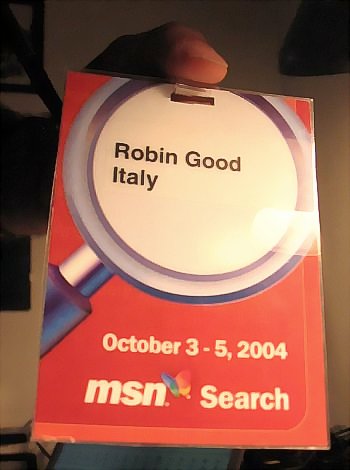
Here is my personal report on the Microsoft Search Champs event, which took place October 3 through 5 2004. I took note of only of a fraction during these two very intense 2 and half days in Seattle. There is a lot more than it should be said and written and in this respect my writing here below doesn't pretened to be an exhaustive journalistic account but rather a personal and much opinionated review of what really stroke me most as the event unfolded and I tried to make sense of what we had all learned from it.
It is a report not about what Microsoft has in plan for up-and-coming new Search Engine, on which I can actually say very little, but about the event itself, the logistics, the learning experiences, the good ideas and the great people that made it, at least for me, this unique a truly memorable one.
Event planning
From what I overheard in the Seattle hotel corridors the event had been in the planning and organization stages for a few months already. In line with apparently similar initiatives launched by the Yahoo and Google search groups, Microsoft appeared decided to attack head front the opportunity of leveraging some highly selected scholars, reporters, journalists, technologists and bloggers to put in check its new business dreams over a powerful Microsoft Search public online service.
Thanks to the suggestions and innovative preparatory work done by Robert Scoble on one side, the brave non-traditional contribution offered by the Microsoft marketing team headed by Sean Carver and the true interest spinning off the different research and product development Microsoft groups involved in this project, the overall event provided for a great presentation arena where technology, business, community and the commons took center stage with equal force and participation from both the presenters and the participants.
For many, like me, the event laid outside the traditional norms and expectations of a traditional tech meeting, as we all breathed a unique, fascinating atmosphere. Everything had to be discovered: from your teammates to the suprises Microsoft had in store for us, everything had an aura of explorative encounter. Or at least that is how I lived it.
Bringing together such a small and highly diverse audience of mini-experts and critical thinkers that had never met before was certainly a very effective starting point which made the collaborative and contributing experience rich and highly textured in tone and arguments.
As a matter of fact upon my arrival in Seattle last Sunday, I discovered that most participants knew hardly anyone else in the invited group. For many, everyone else was a complete foreigner and though there were a few "everybody-knows-about-them" online personalities (David Weinberger [co-author of the Cluetrain Manifesto, Wired contributing writer], Dave Winer [godfather of RSS], Chris Pirillo [the most popular geek of smart technologies and tools]), only a handful of them had actually met face-to-face before the event.
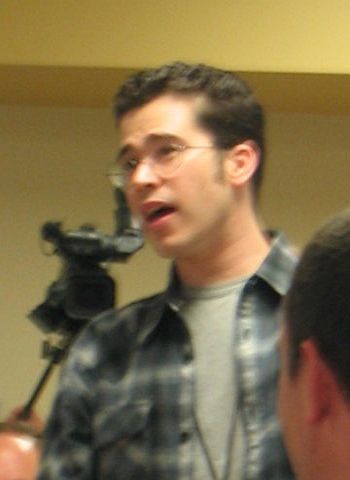
Chris Pirillo
In this respect I think Microsoft did a great thing, by clearly opening up to voices and ideas that were not just the typical mainstream geek audience you would expect to see at this type of gathering.
Such broad-minded, open-ended and explorative attitude opened up many opportunities and fruitful synergies among the Search Champs participants themselves, who, free from having to achieve specific business mandates, roamed the breaks hooking up with newly met pals on topics and issues that stretched from Microsoft core driving topic to personal interests and projects of all kinds.
Search Champs - Representation, gender and equal opportunity
Yes, there have been a few complaints about the unbalanced number of Search Champs invited males versus their female counterparts, but Microsoft has been prompt in acknowledging its limited success on this front.
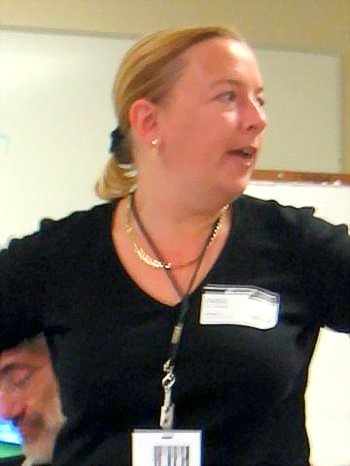
Liz Lawley of mamamusings the only woman Search Champ
Being a consultant to many international organizations, I have personally experienced how difficult it is to strike a balance when it comes to provide an equitable and well-balanced representation of people that doesn't show partiality or favour for any specific nationality, race or culture.
But, certainly Microsoft was not after emulating the UN in this effort of bringing together this group of planetary information seekers. And so, while we had for example five people from Italy, there were none from Germany, Spain or from the northern Scandinavian countries. Holland, Belgium, France and the UK all had at least a presence, and so did Australia, New Zealand and South Africa, while Asia ended up not having any representation at all.
In a group that totaled about 30 selected individuals, half ended being from the US and the other half from the rest of the world.
Organization and logistics
Organization and logistics played also a relevant role in how the event further developed, and in how we as participants, perceived Microsoft and its associates ability to organize, coordinate and ride the typical, world-renowned surprises that high-tech reserves to anyone who takes computers and the Internet as reliable "givens".
The Search Champs group was hosted in downtown Seattle at the Monaco-Seattle Hotel, a charming resort with a taste and style too baroque and American to set me up for what I envisioned would have been a truly cutting-edge set of breakthrough presentations from Microsoft.
While the rooms were very spacious and rich in furniture, I found a complete lack of personality and style in their outlook. Double TV sets inside major closets is something you see only in the US and which screams out loud how much Americans are subdued to what the tube gods have to shove on them. The only appliance that I would have enjoyed having access to was a CD-ROM to play some music, but there was no trace of it. Even with the most positive and tolerant attitude one can have, USA has just gone way overboard with the forced presence of television in most any of its publicly accessible spaces. From bars to pubs, from hotel receptions to airport waiting areas there is no place where you can be exempted from this ongoing brainwashing presence. Give us a break, please. (There exist other ways of finding about what is really happening in the world and of getting some TRUE entertainment out of life, believe me).
But this was nothing compared to some other surprises I and a few others, had to face in the coming hours.
It doesn't take in fact any extra-terrestrial intelligence to anticipate that people passionate and dedicated professionally to online communication technologies will arrive to such an event expecting to work and connect just as easily as they had been doing in their homes and offices until the day before.
But, as Microsoft learned the hard way this time, to make everything working smoothly and reliably it takes a lot more than having the dominant world OS, selecting the right people and a getting a good five-starred hotel.
To make the story short and the wound less painful let's just say that for the first 24 hours I could not even send out emails to my contacts. The hotel email server didn't appear to like to send out emails even after all accounts I had, had been reconfigured to reflect the email setup received by the hotel-provided hot-line support service.
Worse than that was the virus epidemic that spread throughout the hotel network as soon as the remaining participants arrived on the afternoon of Sunday the 3rd. Someone, according to official reports, had his PC infected, and in a matter of minutes of hooking up to the Monaco-Seattle LAN network, it sent its deadly load across all rooms, infecting those other few who were not protected enough and bringing the available bandwidth and network resources to a deadly crawl.
Go figure what to do, when everything doesn't work and you have a tech support number where the best thing they choose to tell you is: "Sir, everything looks fine from this side. You should not be having any particular problem." What can I say?!? .....
I thought I was in the US, in THE most technologically advanced place on the planet and guest of undoubtedly the largest and most successful technology company in the world. How could all this be happening without anyone taking notice?
As a matter of fact the Search Champs SWAT Rescue Team had been arriving itself while these events were developing though it had not had time itself to realize how bad the situation had already gotten in those hours of early arrivals between Saturday and Sunday.
Happily, that Sunday night, the first official get-together of Microsoft organizers and invitees allowed for the bad news to rapidly travel from participants to coordinators (the Fallon agency team :: what I call the SWAT team) . Many who had just arrived on Sunday evening hadn't figured out yet what was awaiting for them in their hotel rooms.
The SWAT team, entered into action the very moment I unconsciously shared my frustrating adventures over a Martini in that first Sunday evening event. Both Stuart and Jim from Fallon (the agency coordinating this event for Microsoft) offered to promptly intervene to understand and resolve the issue. These were the great guys who made up a small but highly courteous, reactive and intelligent group managing all of the needs of the Search Champs from airplane booking to stealth remote email server reconfiguration and virus eradication.
Wade, Jim, Britta, Brenda and a few others I didn't get to learn the names accompanied us everywhere we went and made sure that smiles were solidly planted on each of our tired but curious faces.
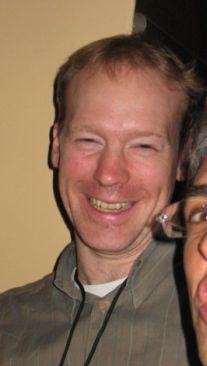
Jim Chestnutt - Fallon - coordinating agency SWAT team
Great job guys. Hard to forget.
And so it was that at 11:30pm on Sunday October 3rd, after a good troubleshooting session with Fallon's top networking guy (Wade Stuart), he said to me: "There is nothing we can do here. We don't even know when and how the Monaco hotel will be able to bring its network to full operation. Having talked also to their tech assistance guys I have no cards I can play here to get you to work again. Would you be willing to move across the street to the W?"
In less than 20 minutes I was transplanted in the lusty, high-touch chill-out music-rich atmosphere of the W hotel with a wonderful elegant room, broadband running and every imaginable touch of slick elegant technology available to me.
The kindness, promptness, courtesy and positively helpful spirit with which the Fallon team took care of my technical problems, made a strong impression on me, and replaced the negative memory of the Monaco with one of efficiency, speed and competence that, to this day, marks decisively my mental record of this unforgettable Search Champs experience. And the W fit perfectly for me the spirit and profile of what I was about to experience in the following 48 hours.
Recharged, wired, and comforted by the great attitude of the SWAT-Fallon team, I readied myself for a first day of listening and slow discovery of what Microsoft had prepared for us to see.
First day on Microsoft campus
Once on the Redmond campus, the Microsoft team pulled out of its hat the best people making up its search team and had one-by-one some of its best people report and present to us the state of the art of their up-and-coming Google killer.
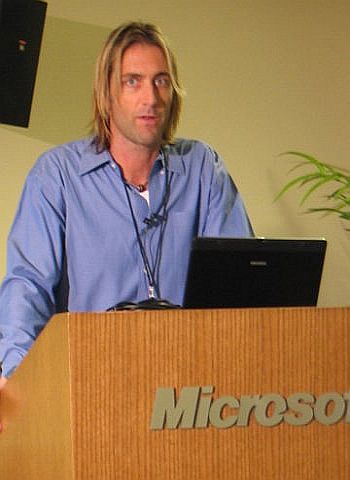
Sean Carver - Microsoft Marketing
Much of the most interesting items we saw during Microsoft multiple presentations were covered by a non-disclosure agreement we all signed before arriving in Seattle.
So, it is unfortunate, but I cannot reveal what appeared to be several innovative ideas, features and in development ideas that Microsoft showed to us.
On the other hand I can confirm, and you can read in many of the other qualified reports about this event, that there were indeed quite some interesting new ideas and features being proposed (see bottom of this report for a list of other articles and posts about the Search Champs event).
The new MSN Search
In their introductory presentation the MSN Search team suggested that we are entering the third stage of Internet search.
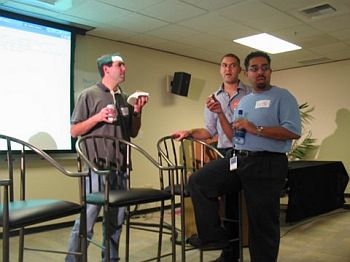
One of the several MSN Search Teams
After a human-edited phase (Yahoo, ODP) and an "algorithmic" one (Google, Yahoo search), Microsoft envisions a new age for online search, characterized by the emerging presence of new powerful search mechanisms such as geo-search, and highly customizable personalization of search results.
The MSN Search team went on then in showing us some of the key facilities and ideas that are going to power the new powerful MSN Search engine.
For what we were allowed to see, the MSN Search had been doing its homework right by significantly refining and improving its own search algorhitm while using other major search tools as constant benchmarking references.
As a matter of fact, you can already test out some of this good work by accessing the newly released MSN Search Tech Preview 2, open to the public and reflecting the best part of the work completed in the last two months.
None of the innovative ideas, interface solutions and other new solutions showcased to us during the 2-day event has yet made it to this Preview release, though stable and fully functional features will be gradually rolled out to it as soon as they will become available.
Though there was no specific date given, the MSN Search team appeared to be seriously determined to have a fully-baked search engine before the end of this year. This does not mean that the soon-to-be-launched new MSN Search will contain the full spectrum of features and facilities that are being developed right now, but that upon launch the new search engine will be able to stand up on its own when compared to its closest competitors (Google, Yahoo).
Ideas from the Search Champs
To honour the truth, I must admit, that for all of what I saw and heard during the first day, the most interesting ideas and features came actually from the participating audience, the Search Champs themselves, who relentlessly questioned, commented, criticized and prompted the Microsoft MSN Search team on most any aspect of the new technology being presented.
So much so, that I felt compelled to ask whether "our" ideas too were covered by the ominous NDA or not. Comforted by a clear confirmation that stuff in my skull still belonged to me and not to Microsoft I started taking good note of the key items the Search Champs pointed to, when Microsoft asked for feedback or opinion.
If I had to summarize some of the great key recommendations that the Search Champs group brought to the table, I would list the following items:
The Search Champs
The Search Champs participated intensely throughout all sessions, providing good questions, critical feedback and carloads of valuable ideas to the MSN Search team.
As a complete outsider and newcomer to such a group of people I greatly enjoyed and admired the contribution and personal spirit of many of the participants. In many ways, some of them have been the real deal of this event, both because of their inspired vision and ideas but also for their passionate and contagious personal energy which, even at a distance, I fully rifted upon.
David Weinberger facilitated the understanding of how wide user-centric positions may be from corporate business ones and how much user needs and expectations may differ from what business strategies would appear to inspire.
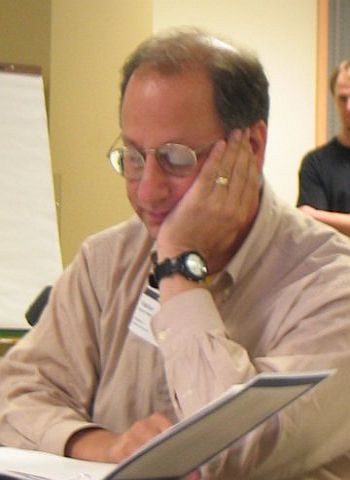
David Weinberger
Together with Liz Lawley (and several other ones), he strongly argued for the importance of respecting user privacy and allowing end users to elect sources of information authority, rather than having Microsot establish these for them a priori.
Dave Winer and Chris Pirillo did everything that was in their powers to get the MSN Search team to integrate and cement RSS into their new technology. Judging from the broad smiles and comments made by Dave on the second day, we must really pay dues to these two guys for having done an excellent job of getting Microsoft immediately on the ball on this one. Well done guys!
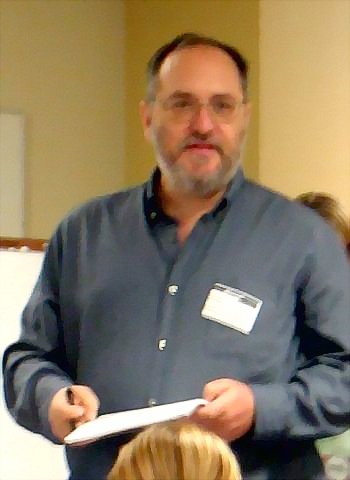
Dave Winer
Buzz Bruggerman, March Orchant, Greg Boser were very vocal as well in criticizing some of MSN Search glaring shortcomings and then also in proposing alternative ideas to take into serious consideration.
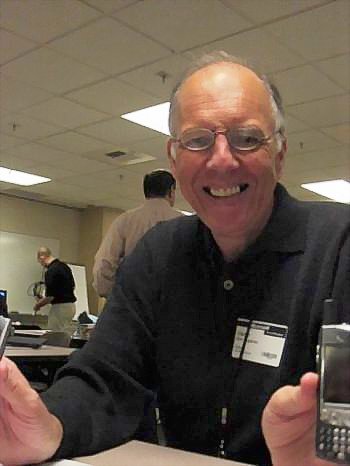
Buzz Bruggeman
The topics and our personal interests as a group deserved at least double the time we had at our disposal, and I must acknowledge that a great deal of what was discussed among participants in the halleys and during breaks remained uncovered and unchallenged during the official venue for lack of time.
Phil Bradley, Matt Paines, Brad Turcotte and Alan Reiter all had good and valuable comments to many of the issues covered.
And, because this was not certainly marginal, Robert Scoble, had always a witty and insightful contribution to add to the many topics we covered.
As a human, I greatly enjoyed some of the humanity or lack of it in some of the participants and truly got a good kick in spending some time next to them.
Unfortunately probably due to my lack of proactive PR skills at parties, I didn't get to meet or get to know in depth a great number of the other search champs, though I discovered a few new friends that I will be exchanging with closely for a long time to come.
I particularly felt close to Marc Orchant, the most human of all, and felt absolutely delighted by his embraceful style and positive attitude. A true story teller, as you can read on his business card.
I discovered a greatly dedicated passionate researcher in Steven Bink from Holland, who I sincerely applaude for his excellent, independent and unbiased online reporting work about Microsoft.
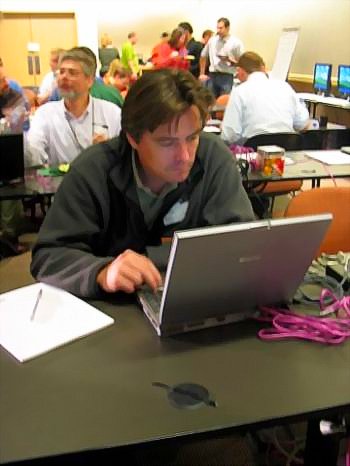
Steven Bink author of Bink.nu
I learned quite a few interesting things from Brad Turcotte who, as a musician, as had to re-invent himself in more than one way and has truly crossed the limits of traditional musicians in attending to the new role of the generous minstrel who shares his vision through his music while receiving honourable compensation and support from those who appreciate his candid efforts. For many musicians today, still dreaming to break into big league top of the charts superstars, Brad and his humble, ethical approach can be a good model and a positive anticipation of many of the things to come.
The three Italian journalists (Andrea Di Stefano, Luca De Biase, Maurizio Bergami) were a great bunch, but as always, they express their best when taken out of the formal venues. I missed having had the opportunity to spend more time with them, as I was trying to understand and learn a bit about their universe, which I have so far completely ignored.
Great interest and empathy with Dutch SEO Paul Aelen, with which I look forward to contribute and exchange on topics of common interest (e-Marketing) and with the witful guy from South Africa, Peter Stewart.
I learned some secrets of Microsoft Tablet PC thanks to the courtesy and charming character of Loren Heiny and got a complete buzz over the competence and methodological inquisitive mind of Alan Reiter.
I missed to get to know many but I certainly feel so enriched by these few ones that I would be very willing to sincerely contribute my best abilities to Microsoft success in this direction in exchange for the outstanding value it has created in bringing together this highly diverse group.
A great group was also the one made up by Microsoft own people, who frequently added to the mix and made it even more tasty and rewarding. Osh and a good part of the other Microsoft presenters opened up to sincerely listen to new ideas, and while there was logical resistance at times, the discussion was always valuable and open.
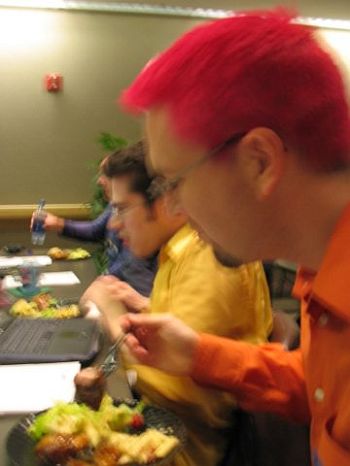
MSN Search VP and Chris Pirillo
Frankly, I would have wished a bit more of the Microsoft people mixing up with us and discussing issues and problems that had come up in the main presentations. For reasons I believe depend more on event design and logistics than on planned decisions from any of the parts involved, there was some lack of this to both parties detriment. I am also sure that many other didn't feel this way, but I think this maybe an area on which there are still good margins of improvement. The richer the conversation, the larger the gain for all.
But I understand.....one step at a time.
Microsoft strategy
Interestingly enough, Microsoft is moving in multiple directions surrounding the need for effective search and has clearly understood that we users need much more than the ability to find relevant Web sites for any given topic.
As the consumer market heats up with multiple competitors, also Microsoft intends to participate in the challenge to bring ubiquitous and effective search throughout the multiple spaces that the user increasingly find himself into: desktop, mobile, wireless.
This maybe a particularly challenging proposition for Microsoft. Not only for the technical challenges involved but also for its ability to understand, or even anticipate the most appropriate business model to sustain these new efforts.
Microsoft is a business company, and by looking at the records a pretty damn good one at it. Nonetheless this, times are changing, and rapidly so. What used to be assets and strengths can rapidly become liabilities and weights so heavy as to drag a whole vision to a rapid end.
As Microsoft has been increasingly facing marketing and sales problems due to many of its long-term strategic choices, its ability to adjust and renew itself in the eyes of the corporate and individual consumer has increased manifold in recent times.
As many of you know, the perception of a Microsoft that is evil to other businesses, that patents new technologies to stifle competitive attacks in favour of its own products and that it drives strong resistance to adopting and supporting open standards has raised many eyebrows and helped more than a few large institutional customers move away from the Redmond giant in recent times.
It is in this light, that Microsoft efforts on the search front appear strategically important, as they may offer altogether new business venues for Microsoft future while opening opportunities to shift user perceptions about the value MS brings to the computerized table.
Unfortunately, what I see is as MS greatest limitation in this effort, is its own roots and business mentality.
Google is no easy beast to beat, and while entering the search engine fray seems nothing but a natural choice for Microsoft to further differentiate and grow its business interests, it may also be that online business models as we know them are undergoing as big a transformation as we have yet to see.
Trends indicate that business models that work today are shifting away from top-down, traditional licensing schemes and toward distributed, bottom-up driven models where users become effectively stakeholders, marketers and evangelists of the very new technologies they are being provided with.
Emerging online business models free up the user from having to remain attached to one specific platform or technology while favouring cross-platform support, interoperability and distribution models that enrich both the passionate users as well as the company that originates them.
If the user is finally embraced as the pivotal point of this strategic business transformation Microsoft does stand more than a good chance of not only taking Google and others to a challenging dinner but of opening itself up to the opportunity for a renewal of the whole Microsoft brand in a way that reflects the true core nature of the connected age: bottom-up, distributed, flexible, compatible, transparent.
It maybe also that Microsoft excessive concern in slapping a business model on each new technology effort it brings to the market may kill its baby before it even gets an opportunity to show its true value. We will have to see. As the Search Champs participating in this 2-day event reiterated multiple times, it is in Microsoft best interest not to close itself again in a game where the business model reinforces the negative perception of a Microsoft has an evil empire set to squeeze money out of every single customer it can grab.
The purists, the Microsoft independent crowd, made of those who use Microsoft tools for their true value to them would only rejoice and applaude a Microsoft open to take a different, humbler and more altruistic stance in some of the markets it occupies.
And it is evident that Microsoft feels this too. The Search Champs event is one good example of this, and Microsoft VPs open questions and insistence in being seriously criticized does communicate an increased awareness of how important this user-centered attitude has become for them too.
The issue is not only one of getting rapidly out of the negatively perceived position Microsoft has consciously gotten itself into but one of being able to adapt to fast changing economic models that disrupt completely the design/development and marketing/sales approaches used until now.
Microsoft has the skill, the tools and the people to make this possible without needing to shoot itself in the foot. It is probably more of a matter of strategic decision-making than one of petty business decisions that needs to take place in Redmond, and if I could tell from the grin and passion seen on some of the MS VPs that sat in turn in front of us, these guys have all of the ability to pull what would be Microsoft greatest business transformation: Become a company that gives powerful tools to people while allowing them to refine, improve and market both the new technology gizmos and the valuable new content formats ensuing from them.
Yes, I am probably dreaming, but this is where I see Microsoft having the possibility of turning the winds completely to its own favour.
I don't' think that creating another search engine, no matter how close to the good work Google has already done, can bring new life, money and improve the decaying institutional image to Microsoft.
The lead Google has taken is no kid's game, and no matter how many resources and great scientists Microsoft throws at it, it remains a very difficult opponent to challenge on its own grounds. Considering also that Google itself will not be sitting still, trying to beat the leader at its own game maybe just an effort not worth its while.
But we have seen Microsoft do this before to Netscape and you may rightly think, that this is again how Microsoft is going at it, this time too.
It is hard to say now how Microsoft will take this opportunity, and I am as curious as you to find out.
What I can say for now, is that Microsoft has shown that it is willing to listen, to question itself and its own ideas and to consider alternative routes, even if they do not come from expensive PhDs.
This, above all is a good sign.
Time will tell, if it was just PR strategy or real meat.
For those of you wishing to dig a little deeper into what others had to say online about this event, here is a good list of all other posts published so far about the Microsoft Search Champs initiative.
Steven Bink's blog
Bink.nu: 2004/10/05
Bink.nu: 2004/10/06
Chris Pirillo and photos here.
SearchEngineWatch: Danny Sullivan 2004/10/04
Misbehaving: 2004/10/03 Liz Lawley
and Meeting Thoughts
and also mamamusings: 2004/10/04
mamamusings: 2004/10/05
JOHO The Blog: 2004/10/04
JOHO The Blog: 2004/10/05
JOHO The Blog: 2004/10/05
Phil Bradley's Blog: 2004/10/06
Phil Bradley's Blog: 2004/10/07
Phil Bradley's Blog: 2004/10/08
Marc Orchant - theofficeweblog: 2004/10/06
Reiter's Camera Phone Report: 2004/10/05
Microsoft Watch: 2004/10/05
Microsoft Watch: 2004/10/01
Jason Dunn's Digital Media Thoughts: 2004/10/03
Loren Heiny's blog - Incremental Blogger: 2004/10/06
Don Park's Daily Habit : 204/10/07
Todd Cochrane's Geek News Central : 2004/10/09
Geek News Central : 2004/10/04
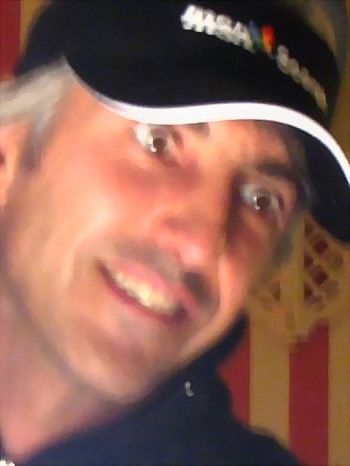
Robin Good with MSN Search cap
| 2004-11-10 11:09:31 |
Hey Robin,
Nice piece of writing !!! I will certainly provide this link to forum etc. very soon.
Kind regards,
Gérald Claessens
Search Champ
| 2004-10-18 20:48:21 |
Hey Robin,
Here the Netherlands calling!
Nice piece of writing! You get all the credits for this, see our articel!
Greetings,
Paul
| 2004-10-14 13:04:03 |
Wow! That's an amazingly detailed and useful write-up. Thanks, Robin.
I hope next time I get a chance to sit and chat with you a bit more; there wasn't enough time to spend getting to know everyone I wanted to... :(
